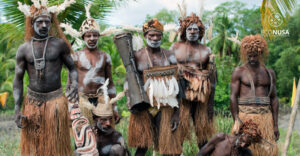
Tanah Papua has potentials of natural tourism which could create a sustainable and eco-friendly tourism business. Preserving forests, ocean and coastal areas could help improve community welfare from tourism. Hence, ecological conservation must not be disregarded despite the incoming economic investment to develop local potential.
Tanah Papua has various fascinating and natural tourism destinations as it is in Papua Province. We could enjoy the beauty of some beaches such as Base-G, Holtekamp, Hamadi, Ciberi and Yacoba. Holtekamp and Hamadi Beaches are connected by Youtefa bridge as the icon of Jayapura City.
Read also: Mangrove, Priceless Ecological Richness or Destruction
Chief of Enggros Village in Abepura District, Orgenes Meraudje, said that tourism development provides economic benefits to the community. Orgenes is one of the tourism actor in Hamadi and Holtekamp Beaches who gets the benefits. He built homestay that lures visitors.
“We used to sell coconut to earn income. By developing tourism destination, we do not sell coconut anymore today. In fact, we get handsome income from there,” said Orgenes in a virtual discussion entitled “Sustainable Tourism Management in Jayapura’s Hamadi and Holtekamp Beaches” on Thursday, November 12, 2020.
According to Orgenes, those beaches are parts of the “veranda” of Jayapura City that needs to be well-ordered. Tourism development that lures visitors could hardly run well if the conservation of water areas here is overlooked. One of the crucial problems deals with waste flowed by sea water and tourists activities.
Read also: Sustainability Paradigm, Key to Save Earth
“Tourism destination from Ciberi Beach to Holtekamp Beach has just been progressed. We need government support. But so far, the government has not yet provided any garbage dump site. Thus, waste management here is still done manually. We burn or burry the garbage from visitors. It would be well-ordered if there is a transportable garbage dump,” he said.
Waste management actually becomes one of the important aspects to promote tourism site. University of Yapis Papua’s School of Economy Dean, Khusnul Khotimah, said after recognizing and visiting a tourism site, they could serve as the “marketing agent” indirectly. Satisfaction of visitor as customer will trigger them to tell their experiences to other visitors.
“Never let any visitor dissatisfied with the service excellence. We have to build this. We target the experiences of the incoming visitors so as to pay another visit. We every so often forget this,” said Khusnul.
Read also: EcoNusa Outlook 2021, Focus in Developing Village Potential
EcoNusa’s Natural Resources Management Program Associate, Aloysius Numberi, said that tourism site management should count the ecological and social impacts. Such anticipation should be taken into account up to the upcoming years. In addition to the fact that tourism as the driver of community economy and other economic sector, tourism has negative impact that should be managed.
“Tourism is human needs that will keep growing. This economic sector will create job opportunity and give contribution to local economy improvement. But, never let our environment be destroyed and our culture disappear due to the impact of the incoming visitors,” said Aloysius.
Editor: Leo Wahyudi & V. Arnila Wulandani






